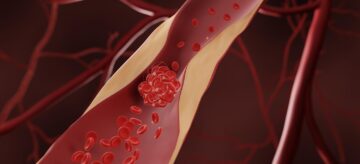From NY Langone News Hub:
 An experimental drug already tested as a potential treatment for cancer, lung disease, and Alzheimer’s disease may slow the progression of atherosclerosis that leads to heart disease, a new study shows.
An experimental drug already tested as a potential treatment for cancer, lung disease, and Alzheimer’s disease may slow the progression of atherosclerosis that leads to heart disease, a new study shows.
Led by researchers at NYU Grossman School of Medicine, the study explored the mechanisms behind atherosclerosis, in which fatty deposits build up in blood vessels. As this buildup hardens into plaques and causes misplaced immune reactions, known as inflammation, it can block blood flow, causing heart attack or stroke.
Published on June 8 in the journal Nature Cardiovascular Research, the new study showed that plasma, the liquid part of blood, from patients with atherosclerotic disease triggers an unusually high inflammatory signal in immune cells. Further experiments then showed that the drug saracatinib reduced this inflammation signaling by more than 90 percent in human blood samples and diseased tissue samples.
More here.
